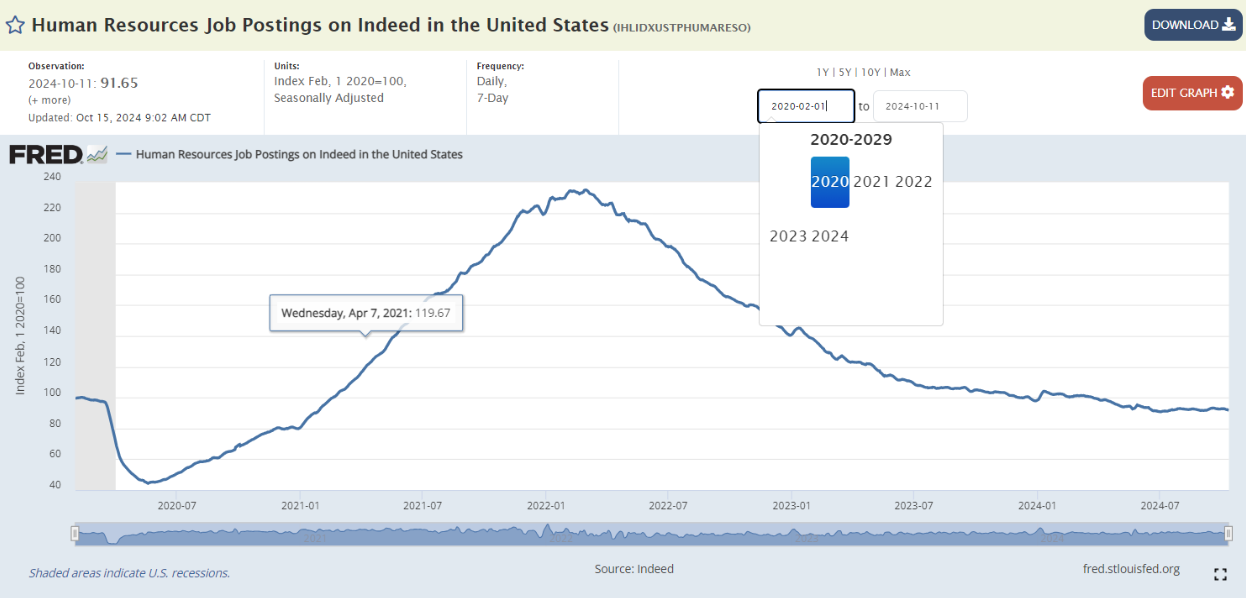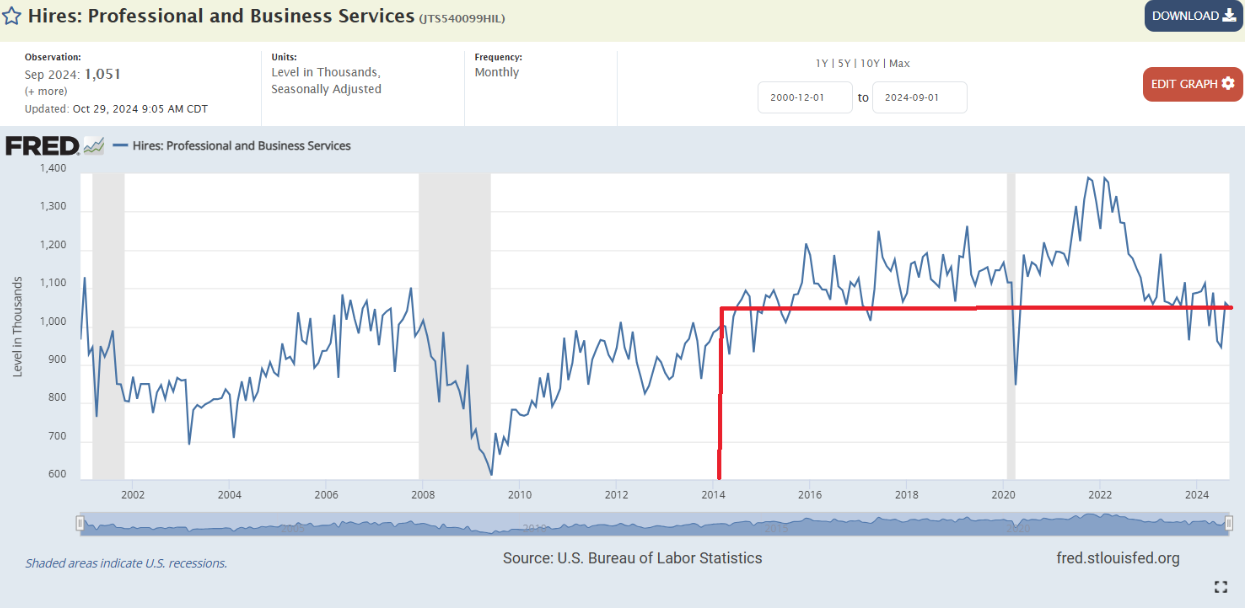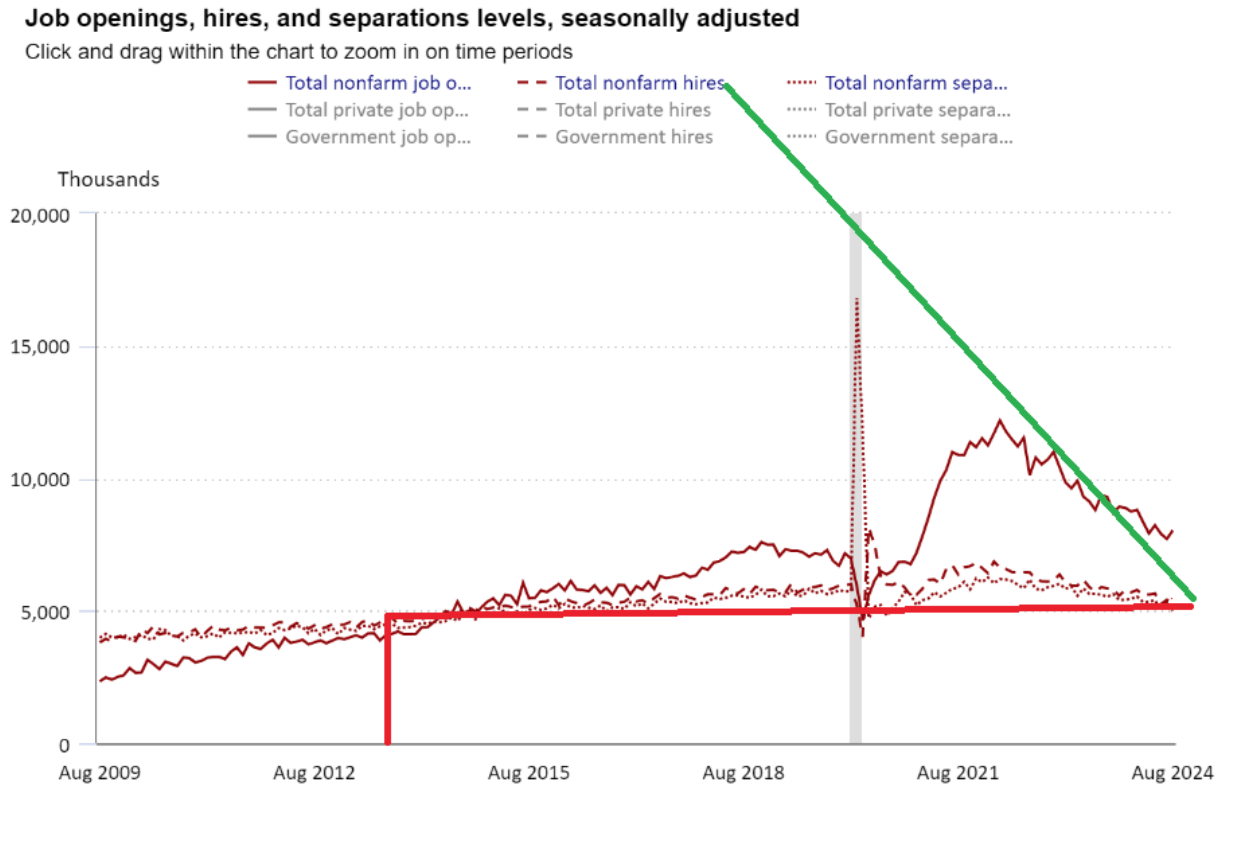Will the Trump Administration Create More Headwinds for the Biopharma Sector? What’s in store?

Where’d all the HR jobs go?
The sharp decline in HR jobs since their peak a few years ago stems from major industry shifts. Automation and AI tools are making HR work easier and tasks such as payroll and benefit admin require less hands-on work. Economic uncertainties and cost-cutting have also led companies to restructure, delay hiring, or outsource HR, cutting internal job demand further.
Post-pandemic, the intense focus on remote work and health protocols has eased, reducing HR’s expanded roles. Companies now prioritize HR professionals with strategic skills—like workforce planning and talent management —over operational roles. Together, these changes reflect a major transformation in HR functions to a leaner, more strategic focus.
FRED
Professional and Business Services Hiring is at a 10 Year low
In September, the U.S. added 254,000 jobs, far surpassing expectations of 150,000, while the unemployment rate fell to 4.1%. Revisions to prior months also showed stronger job growth. This job surge comes just before the election. Despite the positive job numbers, weaknesses in the labor market remain, with slowing hiring rates and declining consumer confidence. While some sectors like construction and health care saw job gains, white-collar and manufacturing sectors struggled to 10 year lows. The Federal Reserve’s recent rate cuts aim to stimulate growth, but economists warn that the labor market’s strength may still deteriorate.
 Can We Blame Biotech’s Languishing on Overconfident CEOs?
Can We Blame Biotech’s Languishing on Overconfident CEOs?
Biotech bankruptcies reached a 10-year peak in 2023/24. With all the recent innovation, why is the sector moving backwards? It seems counterintuitive that, in an era of AI and data science advancements, the industry is facing more failures. Could a lack of humble leadership be a key factor?
Confident leadership is essential to any company’s success, but when does confidence become overconfidence? Overconfident CEOs can mismanage resources, overlook critical data, and make risky decisions without proper checks.
In biopharma, where innovation is key, leadership plays a pivotal role in navigating complexities, fostering collaboration, and ensuring that technological advancements translate into sustainable outcomes.
The recent uptick in failures suggests a shift from objective data analysis toward ego-driven decision-making. This highlights the importance of humility, yet finding a genuinely humble CEO who embraces criticism is rare.
Leaders who are open to second-guessing and constructive feedback likely create stronger programs, better company culture, and improved performance. Research shows that humility fosters trust, engagement, and better team dynamics, while overconfidence often leads to risky, misguided decisions. Unfortunately, charismatic, bold personalities are often mistaken for strong leadership and can overshadow genuine humility in hiring processes.
Humble leadership isn’t without challenges—self-aware, collaborative CEOs may face slower decision-making or receive less favorable evaluations for conservative forecasts. Despite these obstacles, humility remains a critical and underappreciated trait in high-level executives.
Ultimately, humble leadership fosters trust, collaboration, and better decision-making—all key drivers of success in biotech. By creating a culture that values transparency, openness, and continuous learning, humble leaders offer companies a real competitive advantage. As seen with companies like Zappos and PepsiCo, humility isn’t just a leadership virtue—it’s the key to thriving in an uncertain, high-stakes environment.
Quick Hits
- Upcoming FDA Decision Dates (PDUFA): Here’s a summary of the FDA’s upcoming new drug approval dates.
- The Best Biotech Deadpool List on the Web: Its been a tough couple of years for Biopharma startups, here is a good list of casualties.
- Market Trends Shift: Bruce Booth Says Products Are In, Platforms Are Out: Bruce has arguably the best VC biotech blog and he overviews how risk cycles affect assets and platforms, shaping strategies for navigating uncertainty and growth in the industry.
- Biotech financing, it’s always darkest before dawn….: Melanie Senior’s linkedin post points out constructive insights
- Why Life Science Fraud is Suddenly EVERYWHERE: The rise of scientific fraud is exposing how systemic pressures and weak oversight are undermining research integrity, prompting urgent discussions within the scientific community.
Sources:
- https://www.fastcompany.com/90825100/toxic-ceo-workplace-culture-leadership-executive-coach
- https://www.sciencedirect.com/science/article/pii/S0148296322002983
- https://theconversation.com/its-hard-to-find-a-humble-ceo-heres-why-81951
- https://www.sciencedirect.com/science/article/pii/S0148296322002983
- Nothing Ventured, Nothing Gained: A Meta-Analysis of CEO Overconfidence, Strategic Risk Taking, and Performance
- Impact of CEO narcissism and hubris on corporate sustainability and firm performance
- https://www.statnews.com/2024/11/06/presidential-election-trump-health-care-abortion-medicare-rfk/












